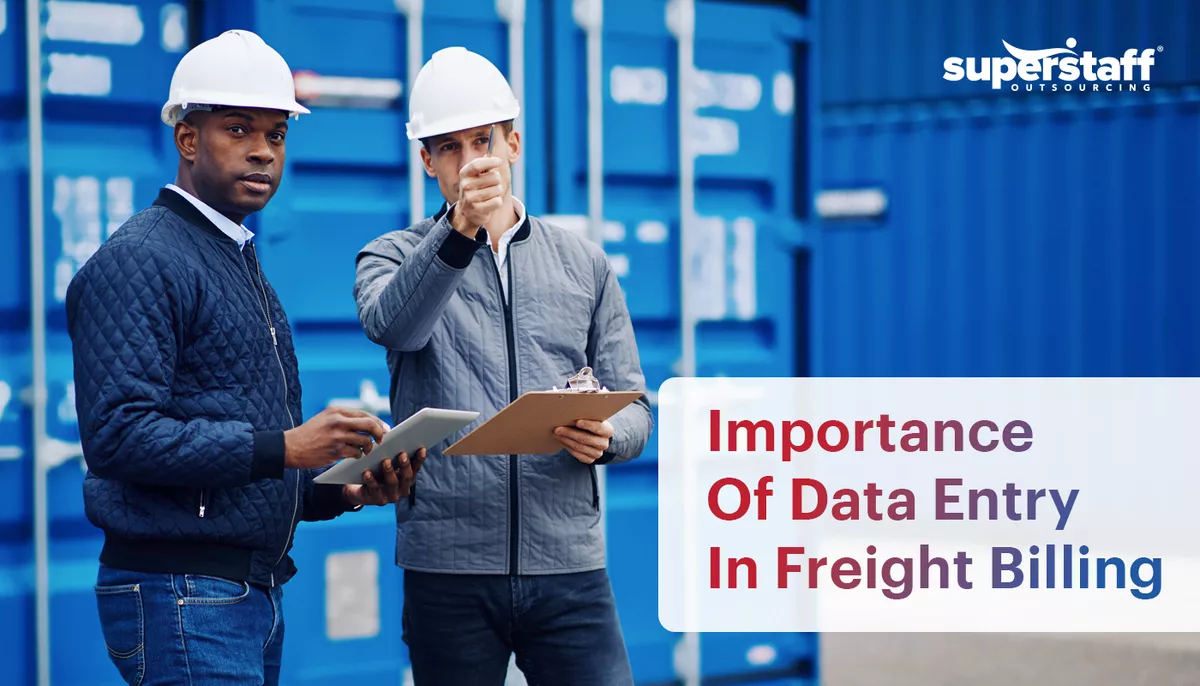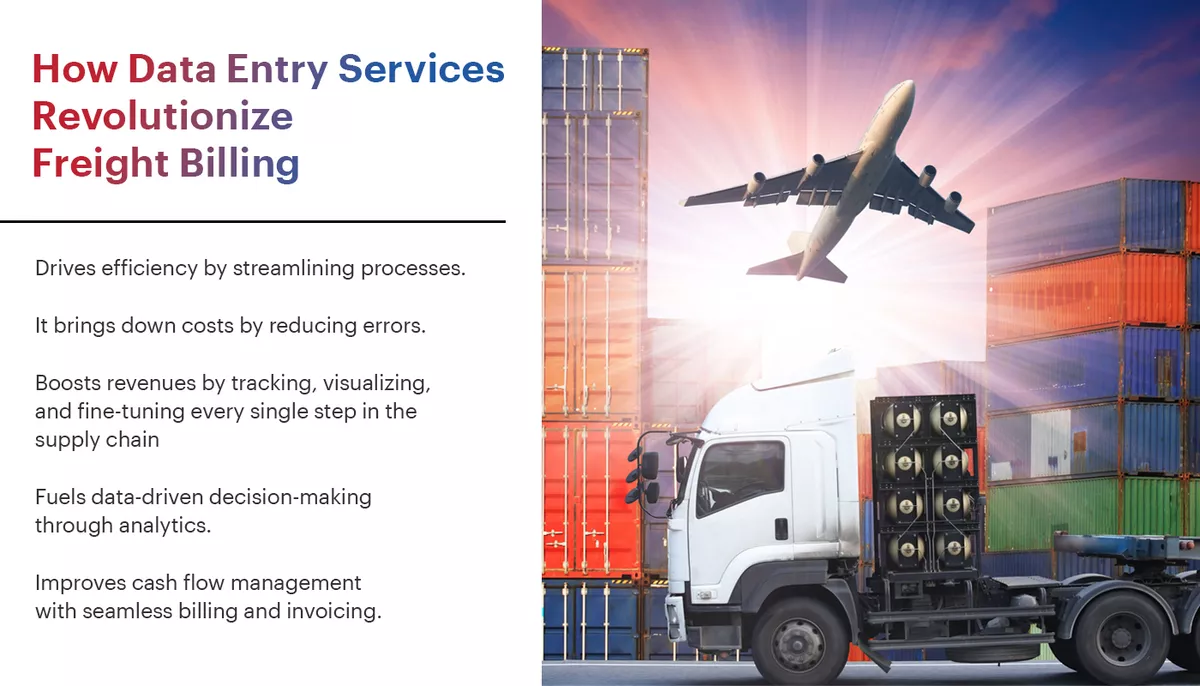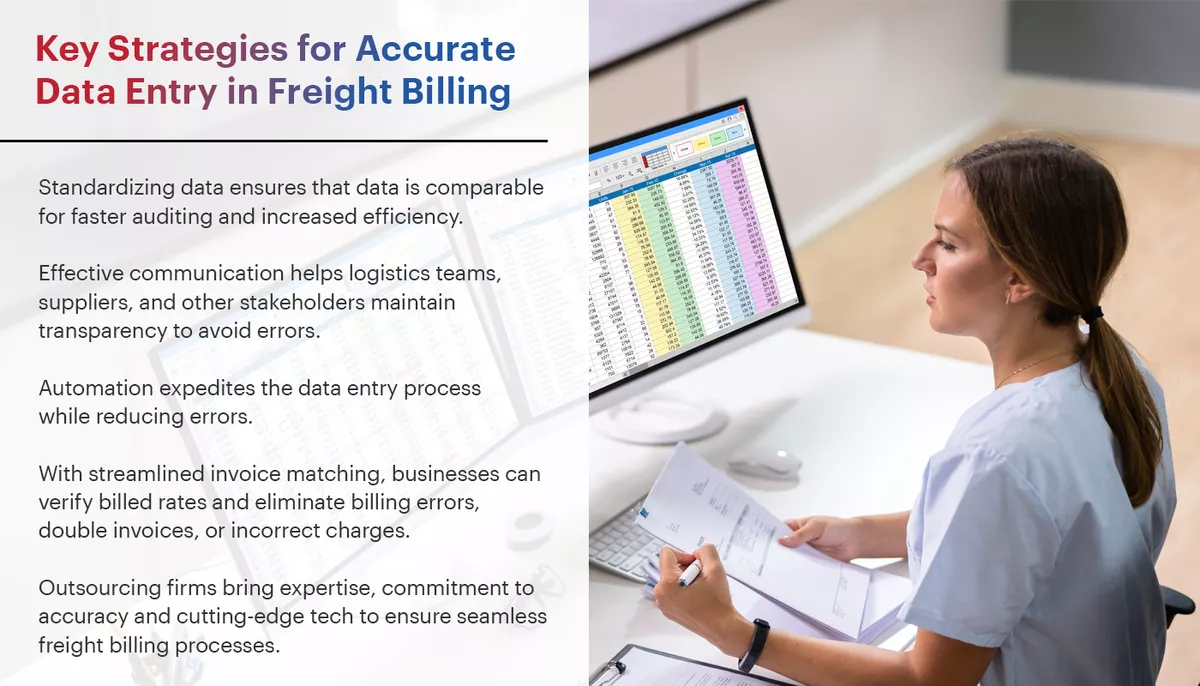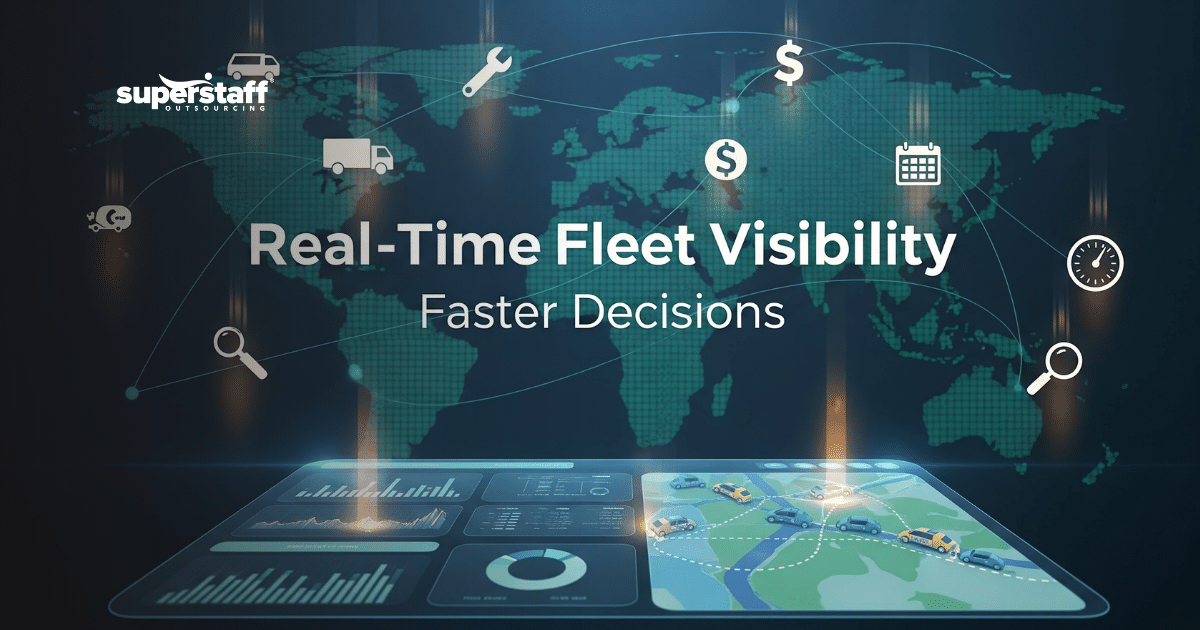
With the growing prominence of data-driven systems, accurate data entry has become imperative in logistics — a sector that runs on massive datasets sourced from airway bills, custom forms, commercial invoices, and other critical documents.
This trend is particularly true for the freight industry. Even the slightest errors can trigger wrong freight rates and hefty overcharges, putting severe financial strain on forwarding companies. In this business, accuracy isn’t just an option; it’s a safety net for your cash flow.
We’re returning to the basics to understand the reason behind this better. What is data entry, and how can we maintain the accuracy of our freight billing data? SuperStaff will dive deeply into these questions as we explore data’s critical role in the industry and essential strategies for ensuring accuracy.
What Does a Data Entry Clerk Do in Freight Billing?
Any respectable logistics business understands that poor data management leads to billing errors, significant financial loss, and a damaged reputation.
Let’s put this into perspective.
A dataset typically includes your client’s name, email address, residential address, phone number, and preferred payment options. Your client may change their number or even move to another place. If you fail to update your data to reflect these changes, you risk unleashing a chain of consequences, potentially causing irreparable harm to your brand image.
A few wrong entries can lead to lost orders, missed payments, delayed shipments, or worse, lost clients, permanently damaging your business.
Fortunately, these can be easily prevented by having highly trained people with the right data entry skills to ensure data quality. Data entry professionals are responsible for encoding raw data into a centralized database. Apart from gathering customer information, they design filing procedures and leverage essential software to evaluate data for consistency, completeness, and accuracy.
A data entry specialist also deals with different types of data in freight billing, such as:
- Shipment Information: Enters all details of the delivery, such as the Bill of Lading (BL) number, Purchase Order (PO) number, item description, quantity, weight, pickup date and time, delivery deadline, and shipment dimensions
- Carrier Information: Specifies certain information about the carrier, such as the carrier name, address, and Standard Carrier Alpha Code (SCAC)
- Freight Charges: Provides the expenses paid to a carrier company for shipping freight to an agreed destination
- Invoice Information: Includes details about the invoice, such as the invoice number, billing address, payment terms, and any special instructions from the shipper or consignee
- Financial Information: Describes the economic activities associated with the shipment, such as the cost per unit, total cost, and payment due date
Importance of Data Entry Services in Freight Billing
Due to its invaluable ability to extract relevant insights, many industry experts now consider data as the new oil of the digital economy.
Just look at the job market. In 2022, there were about 157,380 data entry clerks in the U.S. — a clear indication of its high demand across industries.
So, why are data entry clerk jobs critical for industries like freight? Let’s explore the benefits of data entry services in the sector.
Efficiency
Efficiency is the bedrock of success and innovation. Each minute can drive progress or be a stumbling block in your operations.
Without proper data management, businesses manually input data and make errors, wasting hours fixing mistakes instead of putting their resources toward profit-fueling initiatives.
The solution is data entry services, a strategy that drives data precision while reducing costs.
Cost Reduction
A tiny slip-up in data entry can heavily impact your freight business — wrong order quantities, mixed-up packages, lost deliveries, and so on. On top of these, businesses spend a lot of money reshipping or replacing these items. Moreover, forwarders might get hit with extra charges, like storage fees, demurrage, and detention, adding more financial headaches.
Suppliers and forwarders must roll up their sleeves and double-check invoices and commercial documents. This process consumes time and energy, but if they don’t do it, they could face legal fees and penalties, adding to their already hefty expenses.
That’s precisely why accurate data entry is critical. It’s the ticket to ditching those massive paper piles and slashing errors that could land you in legal trouble. This step also eliminates the need to bring on more in-house staff to pore over freight bills, saving you a lot of money on salaries, equipment, and office space.
Revenue Increase
Most losses in the logistics industry are fueled by revenue leakages that accumulate over time. Take delayed deliveries or clients returning items. What do these two have in common? Inaccurate data entries.
The best way to combat unnecessary costs is to strengthen your core strengths. For forwarders, this means keeping those datasets squeaky, clean, and accurate using cutting-edge freight computer software to track, visualize, and fine-tune every step in their logistics game.
Top-notch data management means you’ve got the lowdown on when your transport vehicle will pick up your client’s item for a smooth and seamless delivery. Forwarders can avoid additional freight costs arising from extended storage and other delays.
Better Decision-Making
Accurate data entry is the key to unlocking a treasure trove of meaningful insights. Once businesses have their data on point, they can turn those insights into decisions that drive sustainable growth. Take logistics companies, for example. They can tap into data to keep tabs on their inventory levels.
With all that information at their fingertips, they can make quick decisions that amp up their company’s profits. They can even map out strategies so they don’t unwittingly waste resources on unnecessary business moves.
Improved Cash Flow
Precise cash flow management is about having clean, accurate, timely data.
For instance, incorrect data on your Bill of Lading (BOL) can spell trouble for your business: delivery delays, payment issues, and penalties. But when your BOL hits the mark, your deliveries will reach the right place at the right time for the right price.
Seamless billing and invoicing are the secrets to keeping your cash flow tip-top. No hold-ups in claims mean money keeps flowing instead of getting stuck in red tape.
Best Practices in Data Entry for Accurate Freight Billing
In a data-driven landscape, precise, high-quality data is the game’s name. Mastering the art of data entry is no longer just an option for businesses. It’s vital to unlocking valuable insights, predicting market trends, and gaining a much-needed edge in a cutthroat market.
With this, here are some strategies you need to quickly and accurately process data for freight billing:
Standardize Data
Standardizing data helps compare apples to apples and oranges to oranges. Regardless of where the invoice came from, this ensures that all data is accurate and comparable so different systems can exchange information for faster auditing and increased efficiency.
Consider carrier scorecards, for instance. These digital tools dish out qualitative and quantitative information about carriers. Keeping the same criteria across all scoreboards makes comparisons fair and spot-on. So, if Scoreboard A rates timeliness, Scoreboard B does the same thing.
Since time is critical for shipments, standardized data about carriers is a lifeline for shippers who need to know which one has the best on-time freight delivery performance.
Communicate in Real-Time
Effective communication lies at the core of shipping and logistics management.
Considering customers’ high expectations on the delivery of their orders, logistics teams and truck drivers must always be armed with accurate information to ensure that customers get their orders on time and in perfect condition.
Communicating in real-time with suppliers and other stakeholders also helps avoid discrepancies in the supply chain. Managing carriers, assuming accountability, and adhering to budget limits all hinge on real-time and transparent communication. Ultimately, when all players are on the same page, errors are reduced to a minimum, and deliveries are smooth sailing.
Automate Data Entry
That fear of “robots stealing jobs” has some logistics businesses stuck in the past, clinging to manual data entry instead of embracing digital transformation. Unfortunately, they miss out on a more innovative, cost-effective, and efficient alternative right at their fingertips: automation.
Tech has changed the game for the logistics sector. Gone are the days of mind-numbing hours of manual data entry. Now, it’s all about systems that can fill up particular fields, like cargo specifics or customs info, quickly and with little to no errors.
The Automatic Data Capture System (ADCS) is an excellent example of this cutting-edge data entry software. It can generate a freight Bill of Lading and automatically respond to a delivery. ADCS can even automate freight processing, lightening the load of your finance team.
Streamline Invoice Matching
Settling your invoices is not the end-all, be-all of the logistics process. Another crucial step is subjecting them to freight audits, contract terms, and payment standards. This final check is “invoice matching,” which means ensuring that what’s on the invoice perfectly aligns with all those predetermined benchmarks and rules.
Thanks to machine learning (ML) and artificial intelligence (AI), invoice matching has become an automated process that verifies billed rates and eliminates discrepancies such as billing errors, double invoices, and incorrect charges. This means companies only pay for what they’ve received, opening doors to more savings and tightening accountability throughout the supply chain.
Outsource Data Entry and Analysis
Despite the rise of data science and the resulting mountain of consumer analytics, most companies have yet to embrace data-driven systems fully. A recent poll revealed that many still struggle to unlock the potential of their data investments:
- Less than half (48.5%) were utilizing data for innovation.
- Only 30% devised an excellent data strategy for their firms.
- Only 24.4% have created a data culture.
As the volume of data exponentially grows over time, adopting an analytics-fueled approach becomes essential to stand out from the sea of competition and thrive in the modern business world.
While a crippling shortage of data experts may stand in the way of this, there is a silver lining. Outsourcing is the next best alternative for businesses struggling to hire locally. Aside from saving time and costs, outsourcing data entry and analysis to a reputable service provider can improve your freight bill administration process, leading to effective decision-making and seamless operations.
Ensure Data Precision in Every Transaction
Due to the fierce competition in the freight industry, businesses must be quick on their feet and seek out innovative solutions to weed out insufficient data before it harms crucial client relationships.
The answer is data entry outsourcing. With a keen eye for detail and a commitment to accuracy, SuperStaff’s expert team is adept at handling the intricacies of freight data, meticulously entering crucial information such as shipment details, carrier information, pricing, and additional charges.
Entrust your data with us and watch as your business grows!








